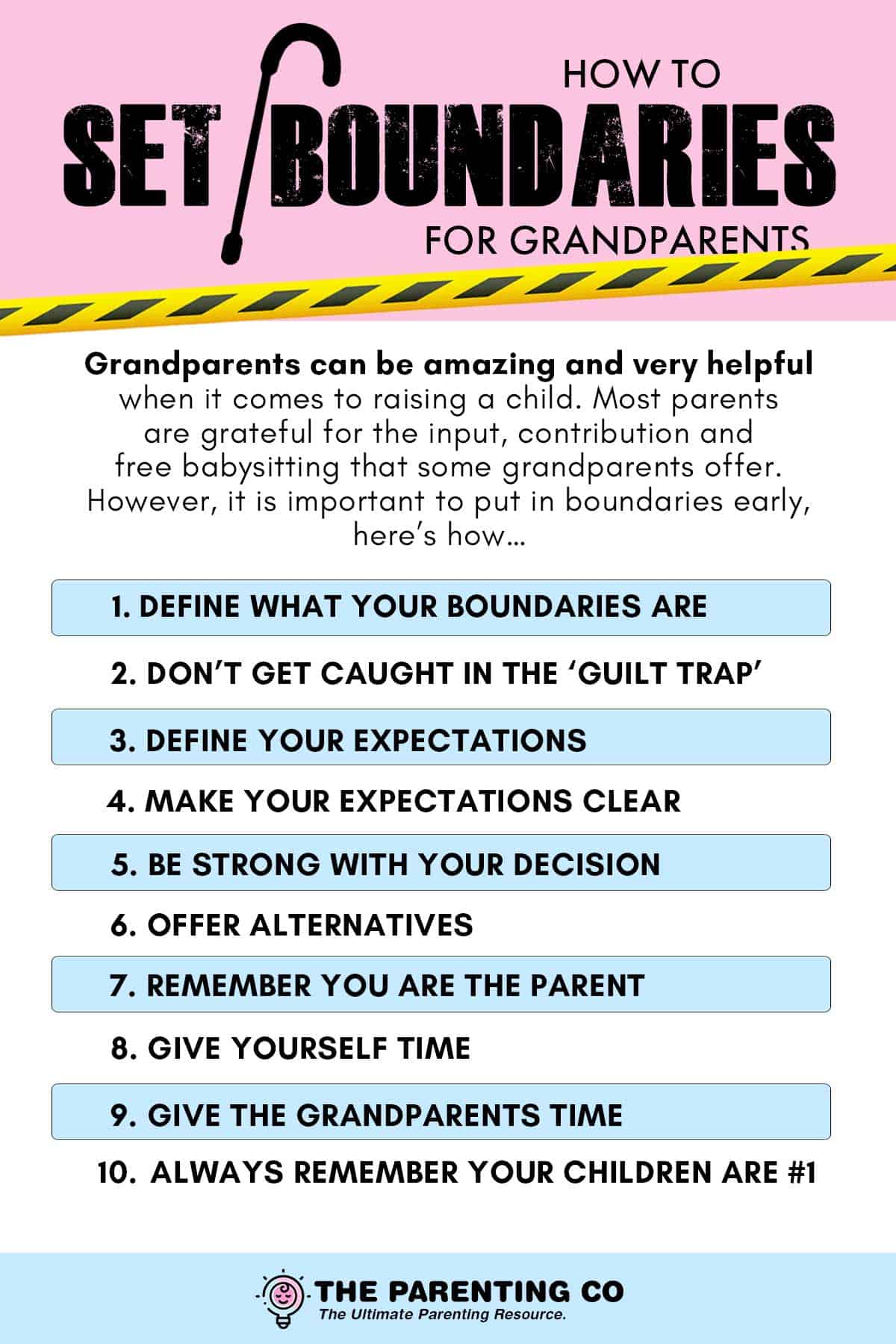Grandparents can be amazing and very helpful when it comes to raising a child. Most parents are grateful for the input, contribution and free babysitting that some grandparents offer. Some parents get landed with the Grandparents from hell and others may sit somewhere in between.
Let’s get one thing straight. As the parent of your child, you have the right and responsibility to make rules and decisions for your child. You have the right to set boundaries with Grandparents who overstep the mark.
Whether you may be noticing or feeling the strain of a few untoward actions from your child’s grandparents or sit on the other end of the scale and unfortunately gifted with grandparents who are shamelessly (or shamefully) toxic, this article is for you. It will help you to place the markers and set the guidelines for what is and is not acceptable and set boundaries where needed.
“I came to the point where I realized there was no turning back, and I had to Deal with the Toxic Grandparents who had continuously overstepped the mark.”
These are your children, being grateful for the help and accepting help doesn’t mean that you don’t have a right to be listened and adhered to when it comes to your parenting voice. Deciding on the best interest of your child and your own life is YOUR JOB as a parent.
Even if you have a great relationship with your child/ren’s grandparents, you may still find the need to define expectations or set boundaries. No matter what the situation, you as the parent have the final say and have the right to set boundaries with Grandparents.
“We have a great relationship with our children, and their grandparents are so wonderful to them, but sometimes there were just a few things like over spoiling that we wanted to change.”
Table of Contents
The Difference Between Overstepping the Mark and Toxic Behaviour
The parents reading this are going to have different experiences, questions, and problems. It is essential to clarify the difference between overstepping the mark and toxic behavior.
What Does Overstepping Look Like
Overstepping the mark is not always classified as toxic behavior. It only becomes toxic when it continuously happens. If you feel that Grandparents have violated the mark, consider yourself in the right place as you have an opportunity to define your expectations and boundaries with them.
Overstepping the mark does not have any real profound implications or effect on the quality of lives, relationships or mental state of yourself and your children.
It may be a seemingly simple act such as offering children sugar-filled sweets or letting your children stay up passed their preferred bedtime.
What Does Toxic Behaviour Look Like
It is important to remember that it isn’t always the person that is toxic, but their behaviors.
“They may overidentify and act out the parts of who they are, such as the victim, bully, perfectionist or martyr, she said. “They act from these parts trying to get their needs met, albeit in an extremely unhealthy way.” – PsychCentral
Toxic behavior includes overstepping the mark, but it is behavior that takes it to the next level. Toxic behavior harms your child or continuously contradicts your parenting rights or decisions. It may be that the grandparents are not respecting the boundaries, requests, and expectations that you have set and are not seeming to understand that you are the decision maker and boundary setter in this situation.
It may be several issues that seem to be happening or one particular event or matter that has left you feeling uncomfortable, dumbfounded or undermined.
We have outlined some definitions and examples of toxic behaviors in our “Toxic Grandparents” article.
Reasons for Setting Expectations and Boundaries
Teaching a Child to Respect Themselves
Society places a lot of emphasis on young people respecting those around them, especially adults. But more importantly, we need to teach them to respect themselves, and this means not allowing toxic or disrespectful behaviors from others.
We are advocates for our children, and if they are at an age or mental ability where they are unable to make these decisions or call the shots, we must do it for them especially if the behaviors of the grandparent are hurting the health, safety, and wellbeing of our child/ren.
If the grandparents are lovely to the children but not so beautiful to you, it is essential to set boundaries around their behavior towards you. Your child/ren will see that you only allow a practice that is respectful and kind from others and will learn from you how to do it themselves.
Setting Boundaries and Expectations Teaches Children How to Best Manage Relationships
The main point and goal of this article are not to get you to withdraw and call out on every adult that you have a disagreement. People are different, and some people will do things we don’t like or that upset us.
Showing children how to set expectations and boundaries will support them in becoming an adult that can maintain relationships and work through disagreements or withdraw from relationships that don’t serve them.
Safety
Some people reading this are at a point where they feel that the Grandparent relationships may compromise the Health, Safety, and wellbeing of the child or themselves. It may be that you have to take action to remove the danger.
Values, Beliefs, and Needs
As a parent, you are entitled to make decisions about what is in the best interests for your child and your family. You may need to set boundaries to uphold your family beliefs, values, needs or parenting styles.
How to Deal With Overstepping the Mark or Toxic Behaviour from Grandparents
Assess the Degree of Behaviour
There will be varying degrees of overstepping the mark or toxic behaviors. Take the time to be calm and controlled when assessing the degree of action.
It is vital that you assess the degree of the situation before making a game plan to deal with it. Make sure you don’t let your emotions take over or make a knee jerk reaction that can sever relationships or overreact when a simple conversation was all that was needed.
Healthy Grandparents can play an essential role in the fun, love, development, and esteem of a child. You don’t want to regret cutting off grandparents entirely due to a simple mistake or misunderstanding because you can easily manage that.
It is much easier to reroute behaviors than it is to repair a relationship and mend hurt feelings.
Don’t Get Caught in the Guilt Trap
Your child/ren’s grandparents may be doing you huge favor for looking after or contributing to your children.
You may be hanging onto a relationship with your parents or in-laws that you want to work so deeply that you are finding it hard to make the tough decisions and set the rules.
You may be suffering from internal conflict because your parents have given you so much, but they are overstepping the mark as grandparents.
Your child may have a grandparent who is mentally ill and cannot control their unacceptable behaviors towards yourself or your children.
Whatever the case, so many parents leave it too late to lay down expectations and set boundaries because they feel guilty and get caught up thinking of the consequences. The guilt trap based on “wishful thinking” and self-blame.
Often we overthink consequences and scare yourself out of taking the actions that you need to take, or wish so hard for someone else to change their behaviors without having to lay down expectations or set boundaries, and that very rarely happens.
It can be conflicting within your mind to set boundaries and expectations with people who played a part in your upbringing, fed you, took you to the sport, paid for your education. But sometimes it has to be done.
How Do You Stay Free From the Guilt Trap
Outcomes, Not Justification
be clear on the result that you want and list down the benefits that this decision or boundary will have for you and your child. It will help you to reassure yourself in times of doubt that you are doing your job and making the right decisions.
If you are dealing with a Grandparent who does not respect that you are indeed the parent of their grandchild, you may find that you begin to or are asked to justify your decision. You do not have to do this as you are an adult and the parent of a child or children. You don’t have to defend, explain, or validate your decisions, state the desired outcomes.
Some situations will allow for and benefit from justification. We will explain this later in the article.
Don’t Overthink
Promise me you won’t overthink the situation and possible consequence. Too often mom’s don’t take action or make decisions because they are fearful of the potential consequences.
We often create instances in our minds that haven’t happened yet. You can set boundaries that diminish implications if you need to. What other people think or how others act is their choice. You can’t control that, and you are not responsible for their decisions.
Be Firm with Your Stance
You may find after having a conversation about your expectations or boundaries that you have some conflict. The grandparent may project their hurt or try and change your mind about your decisions.
You have to be firm in your stance about this. Know that what you are doing is right and in the best interest of your child and stick to it. It may seem harsh but at the end of the day, you are the parent, and the grandparent has the choice to take or leave what you say. They need to understand that as the parent if they choose to go or ignore your requests or boundaries, that you may have to set firmer ones.
You are a Team
Remember that you and the other parent of your children are a team. If you have a good relationship, you can make sure you are on the same page and support each other in this decision. It will help reduce any pressure you may feel; it will also ensure that you aren’t left feeling alone.
3. Evaluate the Type of Relationship and Part that Your Parents/The Grandparents Play
You must put time and think into evaluating the type of relationship that your parents will have with;
- Your children
- Yourself and your partner
Sometimes the toxicity and overstepping of boundaries are experienced by yourself or your children.
If it goes against your desires as a parent or effects your parent, you need to think about the actions that you would like to take.
One thing to remember is that your Parents may be fantastic Grandparents. They may love your children, treat them exceptionally well and even have their best interests at heart. But it is, in fact, you, your space and your decisions as an adult of parent that they are pushing, invading or disrespecting.
You may choose to do this before your children enter the world. Other people may feel that they have to do it as a result of their children entering the world.
Think about:
- The part they play in your life and your child’s life
- The access they will have to you and your children
- The type of influence that you want them to have in your life and the life of your children
4. Define Your Expectations
YOU are the PARENT of YOUR child. It means that you have the ability, right and obligation to make good decisions for your children’s life. Being a parent means that it is NOW essential to make decisions about your own life, health, and emotional wellbeing.
Just like with assessing the degree or extent of the behavior you must take time to consider what your expectations are that you expect they will uphold.
What is the type of acceptable behaviors that you expect from your grandparents? What values and rules to you expect to be maintained or supported.
You have to be clear on your expectations and make them clear to yourself; you cannot expect anyone else to understand them if you aren’t sure of what you hope.
Also, make the bigger picture clear by working out why you are setting expectations. What are the different values that you believe in or outcomes that you want? Explaining this will also help the Grandparents see the bigger picture and reasoning behind your expectations.
5. Make Your Expectations Clear
Now that you have considered and defined acceptable behaviors and expectations, it is time to share this with the Grandparents.
Be respectful when explaining your expectations. Remember, although the action may have upset you, the grandparent may not be aware that they have overstepped the mark.
Script starters for making expectations clear
To help you out we have provided some sentence starters to help you explain your expectations to the Grandparents. These help you to give a clear indication of your expectations and what you expect from them a result.
- As a family, we have decided that our values are________________ Can You Please_____
- We want our children to _______________________ We would appreciate it if_________
- Our parenting approach involves___________ We would like_________
- As parents we_____________ In the future ____________________
6. Set Boundaries
Some people may need to explain their expectations and boundaries come in the form of simple alternative behavior. E.g., “I would appreciate it if you don’t give my children foods containing XYZ, or stay up past XYZ.”
I can hear so many of you going, BUT I HAVE! If you have made your expectations continuously clear, it may be time to set boundaries.
If your expectations and boundary setting seem ignored or the behaviors are more on the drastic side, you may need to set stricter boundaries.
I get it. I felt like I had put up a boundary and was continually moving it further back and further back as I needed to.
Of course, cutting toxic grandparents cannot always be done lightly. There is a big difference between enforcing ground rules for a controlling grandparent vs a grandparent that lets a child stay up a bit too late or binge watch My Little Pony until the theme song becomes annoyingly repetitive. These things may be indulging your child a bit too much for your liking and may take a conversation.
But it may be that the behaviors are continuous, and your wishes disrespected. You may also be like me and at the point where the practices are so toxic that it becomes dangerous and you may reach a point where you decide it is no longer healthy for the grandparents to play the part that they are playing or have the same involvement with yourself and your children.
It is crucial to set boundaries in a way that is tactful, especially if you feel that there may be a possibility of hurt or conflict.
It is also essential to be calm, understanding and firm with your stance. You can also explain your reasoning if you feel the need and your relationship allows for this. For example; “I understand that you love your Grandchildren and you like to spoil them. We as parents try and keep our children away from sugar because it affects their mood.
It is always beneficial to offer an alternative and provide a solution. For example: “It would be great if you could spoil them in other ways. They love being around you, and maybe you could take them to the park or buy a small toy as an alternative”.
You might need to explain that there will be further consequences or in some cases set new boundaries if your initial expectations and limitations not met. For example: “I understand that you personally do not like the children’s father. It is important for their development that he is not spoken about in a bad way in front of them. I have asked for you not to do this. If it continues to happen, I will be limiting contact until you can control what you say about him in front of them”.
To set boundaries, you will first have to take the time and consideration to:
- Decide on what are your boundaries
It may be as simple as reminding our outlining of rules and expectations. It may be that you wish to limit contact or the type of contact or influence the Grandparents have.
- Decide on how to best deliver the information regarding your boundaries.
It may be that you have a conversation, write and email or in extreme cases have legal conditions ordered on the person by the authorities.
Setting Boundaries Guidelines:
- Define your boundaries.
- Deliver your boundaries in a way that is tactful, calm, and understanding.
- Be strong with your decision.
- Offer an alternative where possible
- Set further Boundaries if required
7. Set Boundaries with Yourself
You may not realize and know it, but you could be creating emotional turmoil or adding fuel to the fire yourself. It is essential to set boundaries for yourself when setting boundaries with other people.
If I could do this again, I would have kept to the facts, set the boundaries and keeping emotions out of it. My parents were unable to understand why I was asking what I was asking and were unable to see the detriment of their actions.
I wanted them to see what they were doing, the damage they were creating for themselves and us and taking responsibility. Also, I so desperately wanted them to realize and change what they were doing so everything could be okay, and we could keep the family unit together. I ended up banging my head against a wall.
So, in the end, I had to set boundaries with myself to remove avenues for contact and remove emotions. I was becoming toxic myself as I felt I needed them to be accountable and I wanted so badly for them to be healthy grandparents.
8. Remember that You are the Parent
When you signed up for the role of parent you took on a duty to make decisions for your child. It includes acceptable and unacceptable behaviors.
People won’t have the same ideas, understandings, or beliefs. That is the way of the world and the difference between Generations.
You as the parent have the final say on what is acceptable and unacceptable behavior, words or actions towards yourself as the parent. We are letting you know it is okay to create expectations and set boundaries.
9. Seek Professional Support
In some particular instances, you may find it hard to deal with your emotions, the conflict or effect that the grandparents are having. Your children may also have been affected by their behaviors and require support from a professional.
You can also gain further advice on how to deal with toxic behaviors or subsequent actions that the Grandparents have chosen to take.
It is okay for anyone to receive professional support. You may feel that you need guidance from a therapist, help with conflict management, mediation or support from services such as the police.
In some instances, you are parents are dealing with situations that are mentally, emotionally and sometimes physically draining. Seeking help and support is okay.
10. Do Not Add Fuel to the Fire
Once there are expectations or boundaries, it is essential not to add fuel to the fire. It is also necessary to not make it impossible for the grandparents to alter their behavior (unless the action behavior is damaging or dangerous).
If the grandparents have let the children stay up after bedtime once, give them a chance to align with your wishes.
If you are dealing with argumentative or poisonous grandparents, sending emotionally fuelled emails, having ongoing conflict-filled phone calls or rallying troops against them will only make the situation worse.
It comes back to setting boundaries for yourself.
11. Give Yourself Time
If you are like me and have had to set boundaries to an extent where you have chosen to cut the children’s grandparents from the children or yourself it is essential to give yourself time.
You may find that you are mourning or experiencing feelings of loss. It is okay. It is okay to feel these things even where behaviors were extraordinarily toxic and unacceptable. At the end of the day probably wished that things were different, you may be feeling let down or find yourself grieving. It is normal. It is okay. Be kind to yourself.
12. Give the Grandparents Time
It may come as a surprise or shock to some (even if asked politely) to change their behaviors if they feel that there was no harm done. It may be difficult for some grandparents to shift their action behavior against their current beliefs to align with your wishes. Be understanding that it may take time for them to digest everything. They may feel embarrassed or hurt.
What to Do When You are Concerned for the Health, Wellbeing, and Safety of Your Child or the Grandparent
It is a no brainer but sometimes the stress of a situation clouds or adds to the dismay of making a decision or taking action. If at any point you feel like the safety of your children, yourself, or the grandparents may be in danger; you MUST call the authorities.
You may be worried that you are overreacting but in situations where a child’s emotional wellbeing or physical safety is in question. The child’s safety comes first.






